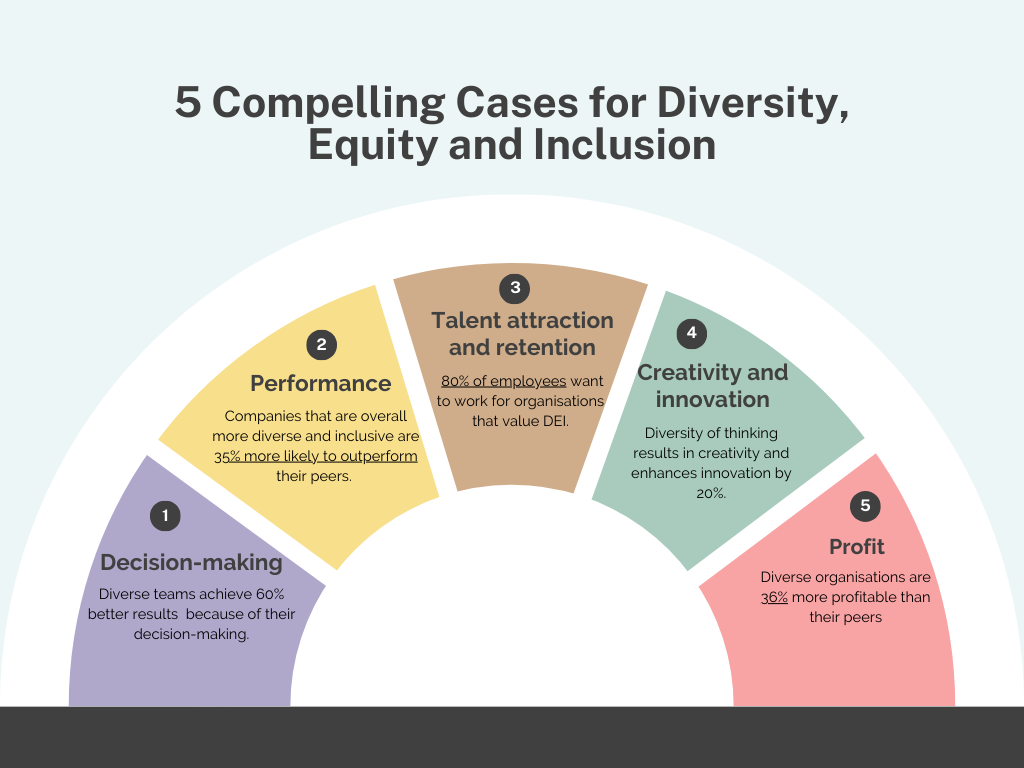I have read, with disappointment, several recent reports on the decline in diversity, equity, and inclusion (DEI) investment and programmes. I have seen some reports being a few words short of describing it as a corporate fad while some are calling it the end of the “virtue economy”.
This decline could be a function of systemic racism, misogyny, and homophobia and/or the characterisation of DEI as a nice-to-have for a company’s image, rather than a real necessity. In either case, there is a significant lack of conviction on the idea and this has to change.
DEI is and needs to be considered:
a positive reimagination of the role of businesses from simply being creators of goods and services to being important contributors to building more equal, equitable and inclusive societies.
a critical component of building sustainable organisations.
simply the right and ethical thing to do.
These are sufficient imperative to invest in creating more diverse, equitable and inclusive workplaces, but companies fail to prioritise these because DEI does not often directly create monetary value. It is, however, capable of so much more. It creates value by optimising organisational output in five key aspects:
1. Decision-making: Diverse teams benefit from varied perspectives, skills, and experiences, and this has been proven to be invaluable in quality decision-making.
A study which examined 600 business decisions conducted by 200 diverse business teams across companies over a span of two years found that:
Diverse teams achieve 60% better results than homogenous teams because of their decision-making.
Up to 87% of the time, inclusive teams outperform others in making sound business decisions.
Teams embracing an inclusive process make decisions twice as quickly while halving the number of meetings required.
2. Performance: Diverse teams have also been shown to consistently outperform their counterparts. It has been reported that companies where women are well-represented on executive teams are 18% more likely to do better financially than competitors. Similarly, companies with diverse ethnicities on executive teams are 27% more likely to outperform competitors. Even better, when companies excel in both gender and ethnic diversity among their executive teams, they have a 9% higher chance of outperforming competitors.
Also, companies that are overall more diverse and inclusive are 35% more likely to outperform their peers.
3. Talent attraction and retention: Diverse workplaces have a culture of psychological safety that makes it easy for employees to feel comfortable, regarded, and consequently, loyal to a company. Employees have been shown to be more likely to stay committed to a company that values and appreciates their uniqueness. 81% of employees who believe they work in an inclusive workplace are happy in their jobs.
DEI also helps to attract talent. About 80% of employees want to work for organisations that value DEI. A diverse, equitable, and inclusive workplace is not only a key aspect of employee well-being and job satisfaction, but it can also help set the business apart from competitors in the marketplace and can help attract and engage top talent with the skills your organisation needs.
4. Creativity and innovation: Differences in backgrounds and experiences impact how people imagine, ideate, and innovate. Combining all these often translates into more robust and richer ideas.
It has been reported that diversity of thinking results in creativity and enhances innovation by 20%. Homogeneous teams, on the other hand, are likely to view things the same way and have similar ideas and similar blindspots. The singular perspective they offer may also not account for people who are different from them.
5. Profit: There is a compelling financial incentive for companies to invest in diversity. Diverse organisations are 36% more profitable than their peers, achieve a 19% higher revenue, and see 66% higher return on equity.
Despite evidence of the strong business case for DEI, it is crucial to reflect carefully on the ethical imperative on you, as an individual with power to shape an organisation, to create an environment that welcomes, respects and represents everyone - including people who are and look different for you.

